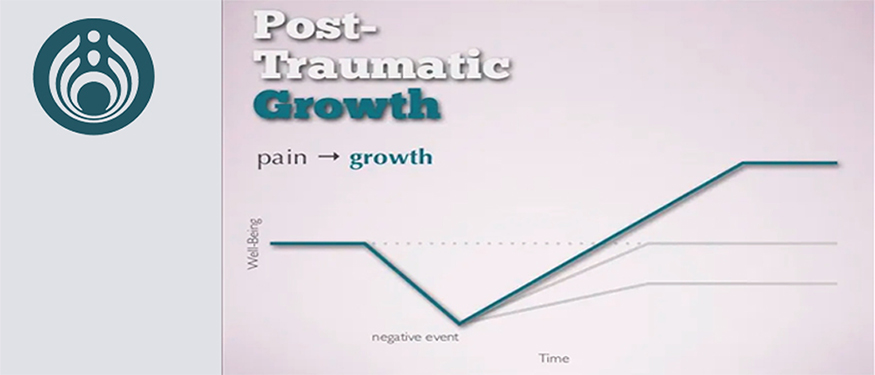From Trauma to Transformation: The Power of Post-Traumatic Growth
When faced with adversity, many people are familiar with Post-Traumatic Stress Disorder (PTSD) – but have you heard of Post-Traumatic Growth (PTG)?
Traumatic experiences like severe weather events or death, can shake the foundation of our lives, leaving us feeling lost, overwhelmed, or uncertain about the future. However, research shows that with the right mindset and coping strategies, these challenges can also become catalysts for personal growth, resilience, and renewed purpose.
Rather than returning to who we were before hardship, Post-Traumatic Growth is about emerging from events stronger – developing better coping skills, deeper relationships, greater appreciation for life, new possibilities, and a stronger sense of purpose. While trauma is undeniably difficult, it can also lead to powerful transformation when we approach it with awareness and skill.
The idea that growth can emerge from struggle is deeply rooted in history, appearing in ancient philosophies and religious teachings across cultures. Today, psychological research confirms what many have long believed: adversity doesn’t just break us—it can also build us. The concept of Post-Traumatic Growth (PTG), developed by psychologists Richard Tedeschi and Lawrence Calhoun, highlights how individuals can experience meaningful psychological change after facing significant life challenges. (Tedeschi & Calhoun, 1995, 2004).
So, how can you cultivate mental fitness and unlock Post-Traumatic Growth in your own life? Let’s explore the science behind it – and some ideas that can help you turn challenges into opportunities for transformation.

"Sometimes adversity is what you need to face in order to become successful." – Zig Ziglar
From Struggle to Strength: How Trauma Can Lead to Growth
The Psychological Impact of Trauma
Experiencing trauma—whether personal, communal, or global—can leave lasting emotional and psychological effects. Fear, frustration, loneliness, and sadness are all common responses to distressing events. If left unaddressed, these feelings can lead to prolonged stress, anxiety, and even depression.
The severity and duration of post-traumatic distress often depend on the nature of the event and individual resilience. Unhelpful, intrusive thoughts can emerge, amplifying distress and creating a cycle of negativity. Some common triggers include:
Constant exposure to pessimistic media coverage.
Surrounding yourself with people prone to negativity.
Worrying about financial security, career stability, or future opportunities.
Engaging in fear-driven discussions, misinformation, or social hysteria.
Avoiding connection with others, even through digital platforms.
Ignoring tools and resources designed to support mental well-being.
Ruminating on factors outside of your control.
These patterns can make it difficult to see a path forward. However, research shows that adversity can also be a catalyst for personal transformation and psychological growth.
The Path to Post-Traumatic Growth
While trauma can disrupt our sense of stability, it can also open the door to Post-Traumatic Growth (PTG) – a concept backed by extensive research in psychology. PTG refers to the positive psychological changes that arise from overcoming adversity, leading to:
A deeper appreciation for life and what truly matters.
Stronger, more meaningful relationships.
Increased personal strength and resilience.
A shift in priorities, focusing on what brings fulfillment.
A richer sense of purpose, spirituality, or personal meaning.
By adopting a resilient mindset, individuals, families, and communities can use challenging experiences as a springboard for growth and self-discovery.
Shifting Your Perspective: How to Cultivate Growth
Building resilience and fostering PTG requires conscious effort. Below are some proactive steps to help reframe adversity and create opportunities for growth:
Reflecting on the Past
Gather evidence: Objectively assess how challenges have shaped you. Many people find that periods of isolation or difficulty have actually strengthened relationships or reduced life stressors.
Reframe with optimism: What unexpected benefits emerged from your experience? Did you reconnect with loved ones, gain new skills, or discover new ways to support others?
Deepen relationships: Have certain friendships or family connections grown stronger through shared experiences? Recognizing these moments fosters gratitude and appreciation.
Moving Forward with Intention
Seek support and information: Equip yourself with strategies, resources, and psychological tools to foster resilience.
Embrace adaptable routines: Find hobbies or activities that provide a healthy mental reset, even in the face of restrictions or uncertainty.
Reinforce self-belief: Remind yourself—and others—that you have the strength and capability to navigate life’s challenges.
Acknowledge uncertainty: Accepting that some things are outside of your control allows you to focus energy on what you can influence.
Filter external noise: Be selective about where you place your attention. Engage with uplifting content, informed perspectives, and positive communities.
What Can You Do To Help?
Ask yourself:
✅ What beliefs or assumptions do I have about adversity?
✅ How can I use this experience as an opportunity for growth?
✅ What mental fitness skills can I develop to better navigate future challenges?
The journey from struggle to growth is deeply personal, but with the right mindset and support, profound transformation is possible.
Ready to Embrace Post-Traumatic Growth?
Adversity doesn’t just break us – it has the potential to build us into stronger, more resilient individuals. Understanding how to navigate and learn from challenging experiences can unlock profound personal growth and set the stage for a more fulfilling future. By embracing the principles of Post-Traumatic Growth, you can transform life’s toughest moments into opportunities for resilience, strength, and lasting change.
At Get Mentally Fit, we offer evidence-based tools and strategies to help individuals and teams harness the power of their strengths and cultivate mental toughness, even in the face of adversity. Whether you’re looking to improve your personal resilience or strengthen your team’s collective mindset, we’re here to help you every step of the way.
Take the next step toward transforming adversity into growth:
📩 CONTACT US to learn how we can support you or your team in navigating challenges and fostering resilience.
📖 Explore our Mental Fitness Check to start your journey toward a stronger, more resilient mindset.
🚀 Discover our Workplace Training Solutions and begin building a mentally resilient, high-performance culture today.


